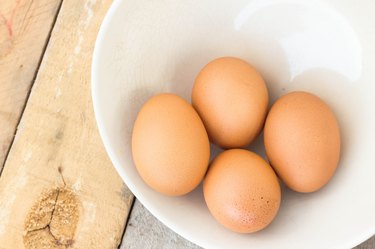
Did you know that one of the most accessible and popular foods in your kitchen can be a true natural medicine after age 60? We’re talking about the egg, that silent ally that many minimize. Eating eggs a day, when properly prepared, can improve your memory, protect your eyes, encourage your muscles, and give you back the energy you thought you’d lost.
But be careful: it’s not about eating them any old way. There are popular mistakes that can destr0y their benefits. First, let’s find out why they’re worth blending into your daily diet.
The 5 key benefits of eating eggs after 60
1. Boosts the brain

Egg yolk is high in choline, an essential nutrient for the nervous system. It helps boosts memory and focus, and may reduce the risk of neurodegenerative diseases like Alzheimer’s.
2. Strengthens Muscles
As we age, we lose muscle mass, which is famous for sarcopenia. Eggs offer high-quality protein that helps preserve and build muscle, thus enhancing mobility, balance, and independence.
3. Protects vision
Thanks to the lutein and zeaxanthin present in the yolk, eggs help prevent common eye problems in older adults, such as macular degeneration and cataracts.
4. Take care of your heart
Far from being an enemy, well-prepared eggs can boost HDL cholesterol, known as “good” cholesterol, which protects the arteries and improves cardiovascular health.
5. Increases energy.

Vitamins like B12 and D, and minerals like iron, are present in eggs. These nutrients are key to keeping vitality, enhancing mood, and combating chronic fatigue.
4 common mistakes that eliminate the benefits of eggs
Although eggs are a superfood, preparing or mixing them incorrectly can deny their positive effects:
1. Frying with unhealthy oils.
Using oils like soybean, canola, or margarine creates inflammatory substances when heated. These processed oils silently harm the body.
2. Eat only the white.
Many people avoid the yolk for fear of cholesterol, but it’s actually where the most important nutrients are concentrated. Discarding it is wasting the best part of the egg.
3. Overeating.
Although it’s healthy, more isn’t always better. The ideal intake for most adults is between 1 and 2 eggs a day.

4. Pair it with processed foods
Blending it with bacon, sausages or white bread can deny the benefits and overload the body with bad fats and refined flours.
How and when to consume eggs to get the most out of them?
What’s the best time of day?
Breakfast. Beginning the day with eggs helps handle appetite, boosts blood sugar levels, and offers sustained energy.
What is the best cooking method?
- Boiled Egg: Plain and fat-free. Boil for 8 to 10 minutes.
- Poached egg: Cooked without the shell in hot water, it preserves its nutrients better.
- Scrambled egg or omelet: Cook it over low heat with a little extra virgin olive oil.















